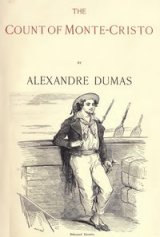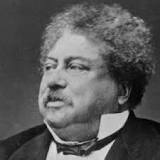The Count of Monte Cristo Page #26
The Count of Monte Cristo is an adventure novel by French author Alexandre Dumas completed in 1844. It is one of the author's most popular works, along with The Three Musketeers.
M. de Blacas pondered deeply between the confident monarch and the truthful minister. Villefort, who did not choose to reveal the whole secret, lest another should reap all the benefit of the disclosure, had yet communicated enough to cause him the greatest uneasiness. “Well, well, Dandré,” said Louis XVIII., “Blacas is not yet convinced; let us proceed, therefore, to the usurper’s conversion.” The minister of police bowed. “The usurper’s conversion!” murmured the duke, looking at the king and Dandré, who spoke alternately, like Virgil’s shepherds. “The usurper converted!” “Decidedly, my dear duke.” “In what way converted?” “To good principles. Tell him all about it, baron.” “Why, this is the way of it,” said the minister, with the gravest air in the world: “Napoleon lately had a review, and as two or three of his old veterans expressed a desire to return to France, he gave them their dismissal, and exhorted them to ‘serve the good king.’ These were his own words, of that I am certain.” “Well, Blacas, what think you of this?” inquired the king triumphantly, and pausing for a moment from the voluminous scholiast before him. “I say, sire, that the minister of police is greatly deceived or I am; and as it is impossible it can be the minister of police as he has the guardianship of the safety and honor of your majesty, it is probable that I am in error. However, sire, if I might advise, your majesty will interrogate the person of whom I spoke to you, and I will urge your majesty to do him this honor.” “Most willingly, duke; under your auspices I will receive any person you please, but you must not expect me to be too confiding. Baron, have you any report more recent than this, dated the 20th February, and this is the 3rd of March?” “No, sire, but I am hourly expecting one; it may have arrived since I left my office.” “Go thither, and if there be none—well, well,” continued Louis XVIII., “make one; that is the usual way, is it not?” and the king laughed facetiously. “Oh, sire,” replied the minister, “we have no occasion to invent any; every day our desks are loaded with most circumstantial denunciations, coming from hosts of people who hope for some return for services which they seek to render, but cannot; they trust to fortune, and rely upon some unexpected event in some way to justify their predictions.” “Well, sir, go”; said Louis XVIII., “and remember that I am waiting for you.” “I will but go and return, sire; I shall be back in ten minutes.” “And I, sire,” said M. de Blacas, “will go and find my messenger.” “Wait, sir, wait,” said Louis XVIII. “Really, M. de Blacas, I must change your armorial bearings; I will give you an eagle with outstretched wings, holding in its claws a prey which tries in vain to escape, and bearing this device—Tenax.” 0133m “Sire, I listen,” said De Blacas, biting his nails with impatience. “I wish to consult you on this passage, ‘Molli fugiens anhelitu,’ you know it refers to a stag flying from a wolf. Are you not a sportsman and a great wolf-hunter? Well, then, what do you think of the molli anhelitu?” “Admirable, sire; but my messenger is like the stag you refer to, for he has posted two hundred and twenty leagues in scarcely three days.” “Which is undergoing great fatigue and anxiety, my dear duke, when we have a telegraph which transmits messages in three or four hours, and that without getting in the least out of breath.” “Ah, sire, you recompense but badly this poor young man, who has come so far, and with so much ardor, to give your majesty useful information. If only for the sake of M. de Salvieux, who recommends him to me, I entreat your majesty to receive him graciously.” “M. de Salvieux, my brother’s chamberlain?” “Yes, sire.” “He is at Marseilles.” “And writes me thence.” “Does he speak to you of this conspiracy?” “No; but strongly recommends M. de Villefort, and begs me to present him to your majesty.” “M. de Villefort!” cried the king, “is the messenger’s name M. de Villefort?” “Yes, sire.” “And he comes from Marseilles?” “In person.” “Why did you not mention his name at once?” replied the king, betraying some uneasiness. “Sire, I thought his name was unknown to your majesty.” “No, no, Blacas; he is a man of strong and elevated understanding, ambitious, too, and, pardieu! you know his father’s name!” “His father?” “Yes, Noirtier.” “Noirtier the Girondin?—Noirtier the senator?” “He himself.” “And your majesty has employed the son of such a man?” “Blacas, my friend, you have but limited comprehension. I told you Villefort was ambitious, and to attain this ambition Villefort would sacrifice everything, even his father.” “Then, sire, may I present him?” “This instant, duke! Where is he?” “Waiting below, in my carriage.” “Seek him at once.” “I hasten to do so.” The duke left the royal presence with the speed of a young man; his really sincere royalism made him youthful again. Louis XVIII. remained alone, and turning his eyes on his half-opened Horace, muttered: “Justum et tenacem propositi virum.” M. de Blacas returned as speedily as he had departed, but in the antechamber he was forced to appeal to the king’s authority. Villefort’s dusty garb, his costume, which was not of courtly cut, excited the susceptibility of M. de Brezé, who was all astonishment at finding that this young man had the audacity to enter before the king in such attire. The duke, however, overcame all difficulties with a word—his majesty’s order; and, in spite of the protestations which the master of ceremonies made for the honor of his office and principles, Villefort was introduced. The king was seated in the same place where the duke had left him. On opening the door, Villefort found himself facing him, and the young magistrate’s first impulse was to pause. “Come in, M. de Villefort,” said the king, “come in.” Villefort bowed, and advancing a few steps, waited until the king should interrogate him. “M. de Villefort,” said Louis XVIII., “the Duc de Blacas assures me you have some interesting information to communicate.” “Sire, the duke is right, and I believe your majesty will think it equally important.” 0137m “In the first place, and before everything else, sir, is the news as bad in your opinion as I am asked to believe?” “Sire, I believe it to be most urgent, but I hope, by the speed I have used, that it is not irreparable.” “Speak as fully as you please, sir,” said the king, who began to give way to the emotion which had showed itself in Blacas’s face and affected Villefort’s voice. “Speak, sir, and pray begin at the beginning; I like order in everything.” “Sire,” said Villefort, “I will render a faithful report to your majesty, but I must entreat your forgiveness if my anxiety leads to some obscurity in my language.” A glance at the king after this discreet and subtle exordium, assured Villefort of the benignity of his august auditor, and he went on:
Translation
Translate and read this book in other languages:
Select another language:
- - Select -
- 简体中文 (Chinese - Simplified)
- 繁體中文 (Chinese - Traditional)
- Español (Spanish)
- Esperanto (Esperanto)
- 日本語 (Japanese)
- Português (Portuguese)
- Deutsch (German)
- العربية (Arabic)
- Français (French)
- Русский (Russian)
- ಕನ್ನಡ (Kannada)
- 한국어 (Korean)
- עברית (Hebrew)
- Gaeilge (Irish)
- Українська (Ukrainian)
- اردو (Urdu)
- Magyar (Hungarian)
- मानक हिन्दी (Hindi)
- Indonesia (Indonesian)
- Italiano (Italian)
- தமிழ் (Tamil)
- Türkçe (Turkish)
- తెలుగు (Telugu)
- ภาษาไทย (Thai)
- Tiếng Việt (Vietnamese)
- Čeština (Czech)
- Polski (Polish)
- Bahasa Indonesia (Indonesian)
- Românește (Romanian)
- Nederlands (Dutch)
- Ελληνικά (Greek)
- Latinum (Latin)
- Svenska (Swedish)
- Dansk (Danish)
- Suomi (Finnish)
- فارسی (Persian)
- ייִדיש (Yiddish)
- հայերեն (Armenian)
- Norsk (Norwegian)
- English (English)
Citation
Use the citation below to add this book to your bibliography:
Style:MLAChicagoAPA
"The Count of Monte Cristo Books." Literature.com. STANDS4 LLC, 2024. Web. 26 Nov. 2024. <https://www.literature.com/book/the_count_of_monte_cristo_34>.




Discuss this The Count of Monte Cristo book with the community:
Report Comment
We're doing our best to make sure our content is useful, accurate and safe.
If by any chance you spot an inappropriate comment while navigating through our website please use this form to let us know, and we'll take care of it shortly.
Attachment
You need to be logged in to favorite.
Log In